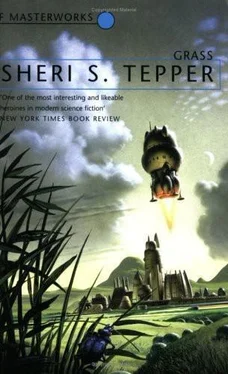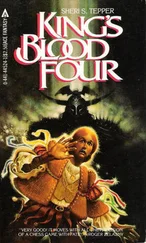Sheri Tepper - Grass
Здесь есть возможность читать онлайн «Sheri Tepper - Grass» весь текст электронной книги совершенно бесплатно (целиком полную версию без сокращений). В некоторых случаях можно слушать аудио, скачать через торрент в формате fb2 и присутствует краткое содержание. Город: London, Год выпуска: 2002, ISBN: 2002, Издательство: Gollancz, Жанр: Фантастика и фэнтези, на английском языке. Описание произведения, (предисловие) а так же отзывы посетителей доступны на портале библиотеки ЛибКат.
- Название:Grass
- Автор:
- Издательство:Gollancz
- Жанр:
- Год:2002
- Город:London
- ISBN:9781857987980
- Рейтинг книги:4 / 5. Голосов: 1
-
Избранное:Добавить в избранное
- Отзывы:
-
Ваша оценка:
- 80
- 1
- 2
- 3
- 4
- 5
Grass: краткое содержание, описание и аннотация
Предлагаем к чтению аннотацию, описание, краткое содержание или предисловие (зависит от того, что написал сам автор книги «Grass»). Если вы не нашли необходимую информацию о книге — напишите в комментариях, мы постараемся отыскать её.
Grass — читать онлайн бесплатно полную книгу (весь текст) целиком
Ниже представлен текст книги, разбитый по страницам. Система сохранения места последней прочитанной страницы, позволяет с удобством читать онлайн бесплатно книгу «Grass», без необходимости каждый раз заново искать на чём Вы остановились. Поставьте закладку, и сможете в любой момент перейти на страницу, на которой закончили чтение.
Интервал:
Закладка:
“I tried to tell him,” she whispered, still looking at the sleeping Stella. “I tried to tell him, just the way I’ve tried to tell you.” And that, too, was true. She had tried to say, “Rigo, just hold me, gently. Let me learn the rhythm of your blood and your breath.” Or, “Stella, be still a moment. Just talk to me. Let us know one another.”
Marjorie remembered lying in the stable with her belly pressed close to a foal, quiet on the straw, the mare whickering above, soft nose pressing down on the foal and on the child-Marjorie both, until all three were same-scented, hay-scented, straw-smelling. Marjorie had felt the blood running in the foal’s veins, felt the smooth pull of the muscles over the bone. Then later, when the foal grew and they raced together, she understood what it was that moved and the spirit that moved it. She had wanted to learn Rigo like that, but he wouldn’t let her.
Stella was the same. Always passionate. Always in the depths or on the heights. Always give me, give me, give me, and never anything warm or gentle in return, never any simple affection. No hug. No little joke for the two of them to share. No peace. Not that Stella shared much with her father, either. No. If she was capable of affection at all, she had saved it all for her friend back home, the beatific Elaine.
Marjorie felt her own heart thudding away under her hand and smiled ruefully at herself. She was too old to feel this jealousy. It was not her heart that yearned toward Stella, it was her stomach, clenching now with an agony of helpless love which she could not show. Showing love to Stella was like showing meat to a half-wild dog. Stella would seize it and swallow it and gnaw its bones. Showing love to Stella was opening oneself up for attack.
“You don’t really love me. When I was little, you promised me a trip to Westriding, and I didn’t get to go!” This, the then sixteen-year-old Stella, rehearsing a grievance at least eight years old.
“You’ve been told a thousand times that Grandpa was ill. Stella. He was too sick to have company. He died not long after that.”
“You promised and then you decided all by yourself we shouldn’t go. You’re always saying we’ll do things and then we don’t. Now you’re dragging me off to this awful place, making me leave my friends without even asking me if I want to go! Why aren’t we more like a family? I wish I were Elaine’s sister. The Brouers don’t act like you do.”
“If she mentions the Brouers to me again,” Marjorie had said to Rigo, “I will strangle her.”
“They’re friends,” Rigo had replied, giving her a curious look. “They’re best friends. Why should you resent that?”
“I don’t resent that. I resent the Brouers being held up to me as a standard of perfection.”
“All kids think some other family is perfect,” he said.
“I never did.”
“Yes, but,” he had said, “you’re strange.”
“I’m strange,” she told herself now, looking down at the sleeping girl, wondering what it was about the Brouers that had evoked Stella’s admiration. What quality did the Brouer family have that attracted her? Family? What did Stella mean by family?
“I wish the Brouers were my family,” Stella had said dozens of times, stubbornly, without explaining, knowing she was hurting, wanting to hurt. “They do things together. I wish I had a family like that.”
“Well, we’ll have a chance to be a family on Grass, Stella. There won’t be anyone else around.” Not that Stella ever wanted to do what anyone else did. Not that isolation would change her.
Stella had clenched her jaw at that, threatening angrily not to come to Grass at all. For weeks before they left, Marjorie had been sure that Stella would approach her with the suggestion that she stay behind with the Brouers.
“Mother, I want to stay here in Sanctity with the Brouers. They’d like to have me stay.”
What would she have said? “Stella, that’s fine. I don’t want to go either. Neither does your father. I don’t feel right about leaving my poor people in St. Magdalen’s. Rigo doesn’t want to leave his clubs and his committees and his nights on the town with Eugenie on his arm. We’re going because we think we must, to save all of mankind. But there’s no real reason you have to go. Stay here and die of the plague, Stella. You and Elaine and her whole perfect family. I don’t care anymore.”
And she had repented her anger, confessed her anger — though not mentioning several other sins which weighed even more heavily — received absolution for it, only to feel it again. And now they were on Grass, and Marjorie still felt anger, still repented, still confessed, still wondered what she would do with Stella, who was as sulky and rebellious and unloving here as she had been at home.
“Why, Father?” she had asked. “Why is she like this? Why is Rigo like this?”
“You know why anyone… The church teaches…” His gentle old voice had begun one of its learned and inflexible perorations.
She had interrupted. “Sin. Even original sin. I know what it teaches. It teaches that a sin committed by people thousands of years ago descends to me. Through my cells. Through my DNA. Mixed in there, somehow, along with my heart and my lungs and my brain, and infected my daughter…”
He had cocked his head. “Marjorie, I’ve never thought that original sin is conveyed in the cells.”
“Where else does it come from? What else is there? The soul comes with the body, doesn’t it, Father? Sin comes with sex, doesn’t it? It isn’t just our souls in bed with each other, is it?”
Sanctity would say yes, the souls were in bed together. Sanctity said marriages lasted forever. Especially in heaven. Which wasn’t what Old Catholics believed. Thank God. When she was dead at least that would be over.
She had wept then, feeling it was all her own fault, somehow. Father Sandoval had patted her shoulder, unable to offer comfort, unable or unwilling to make her feel less guilty. Nothing had done that, not even all the work at St. Magdalen’s, which was supposed to be an expiation.
Marjorie left Stella’s room, shutting the door quietly behind her, her mind moving in old, familiar patterns. Perhaps when Stella was older, middle-aged, they could be friends. Stella would marry someone. She would separate herself from them, by distance, by time. She would have children. In time, they might be friends.
The thought made her pale, gasp, made her bend over the sick pain that struck her. There might be no time for any of that. All the sulkiness, the lack of joy — there might be no time for it to work itself out. There might not be time for Stella. There was no proof they were protected here on Grass. There was only the assumption, the hope. And the children couldn’t share even that. They couldn’t be told the real reasons for the assignment. Too dangerous. So said Sanctity, and Marjorie concurred. Tony might forget himself. Stella might rebel. Either might say something undiplomatic to one of the bons and the fate of humanity could hang upon that saying. Assuming. Assuming there was any truth to the rumor. Assuming there was really no plague here on Grass.
She sat frozen then, waiting for the morning to come, using the rote of prayer to calm herself.
As soon as light showed clearly above the grasses, Marjorie went down to the cavern where the horses were stabled. She needed to feel them, smell them, be assured of their familiar reality, their uncomplicated loyalty and affection. They did not throw her love back in her face; they repaid a little attention a thousand times over. She went from stall to stall, petting and stroking, handing out bits of sweet cookie she had saved for them, stopping at last at Quixote’s stall to peer in at him where he pawed the earth again and again, a nervous, begging gesture. She put her arms around him.
Читать дальшеИнтервал:
Закладка:
Похожие книги на «Grass»
Представляем Вашему вниманию похожие книги на «Grass» списком для выбора. Мы отобрали схожую по названию и смыслу литературу в надежде предоставить читателям больше вариантов отыскать новые, интересные, ещё непрочитанные произведения.
Обсуждение, отзывы о книге «Grass» и просто собственные мнения читателей. Оставьте ваши комментарии, напишите, что Вы думаете о произведении, его смысле или главных героях. Укажите что конкретно понравилось, а что нет, и почему Вы так считаете.












